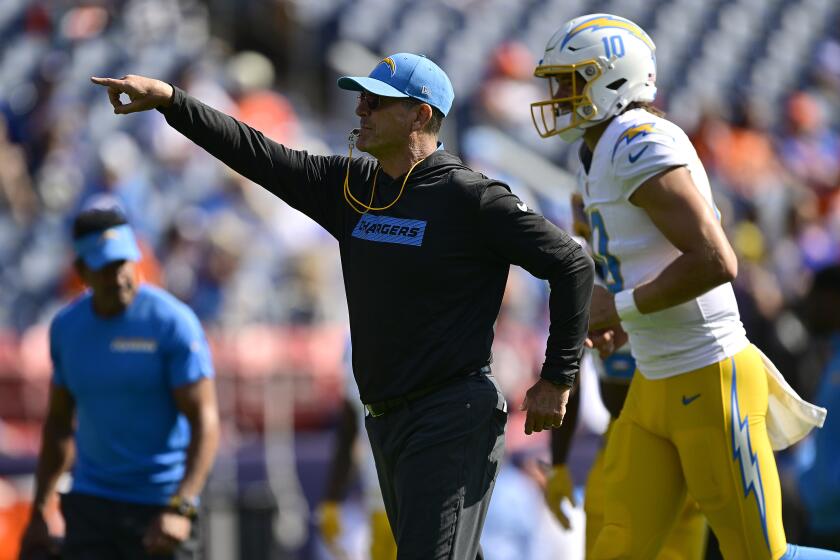Column: The coronavirus is one of many reasons to stop shaking hands
The coronavirus outbreak has us all on edge and struggling to understand how to safeguard ourselves and our loved ones.
With just a few cases confirmed or suspected in Orange County, we have so far been spared the worst outcome. But because so much remains unknown about the virus, and a great deal of misleading information has been circulating, it’s been difficult to filter out the noise and focus on common-sense responses.
Some of the steps local residents are taking that might seem sensible at first blush, like wearing masks, are actually unnecessary, according to public health experts.
Other suggestions that have been floated are downright absurd, like avoiding Chinese food — or dangerous, such as gargling with bleach.
Meanwhile, Costco stores have been swamped with anxious customers stocking up on everything from paper goods to disinfectant wipes, events are being canceled, and travel plans are being put on hold. Local residents were particularly relieved that a proposal to quarantine infected patients at Fairview Developmental Center in Costa Mesa was derailed.
Amid this flurry of activity, experts tell us that the best way to protect against virus transmission is simply by washing hands thoroughly and frequently.
Of all the behavioral changes prompted by this crisis, one of the most noticeable has been the sudden shunning of the ubiquitous handshake. For the time being, we are told, it’s safer to utilize a bow, wave, elbow or fist bump to greet people.
German Chancellor Angela Merkel caused a bit of a stir when she said she planned to avoid handshakes during the crisis and that she hoped others would do the same. Her announcement, though understandable, was a signal of the seriousness with which she viewed the situation, as handshaking is a deeply ingrained ritual in tradition-bound Germany.
So far, calls to curtail handshaking are offered as a temporary response to an emergency situation.
Obviously, there are far more pressing issues involving the coronavirus, including efforts to contain transmission and develop a vaccine. Whenever these goals have been achieved, it’s reasonable to believe that most people will seek to return to normal. We’ll be back to pressing the flesh in typical fashion.
But maybe the best way forward is to permanently ditch the handshake.
I’ve never been a big fan of shaking hands. Let’s face it, the custom is awkward and a little weird, too often requiring complex social calculations, overly intricate maneuvering and heaps of second thoughts about the relative strength, length and clamminess of the whole affair.
Men are judged for the manliness of their grips, women feel pressured — as always — to balance assertiveness with the correct degree of femininity and everyone secretly wonders about the cleanliness of the hand they’ve consented to grasp. The shaking aspect of this curious ritual, which most of us have never mastered, only adds to the gawkiness.
Now, as this scary viral episode so clearly illustrates, we must also consider whether the health considerations associated with shaking hands should continue to be overridden solely for the sake of what we traditionally view as good manners.
Do we really want to go into temporary lockdown mode on handshaking every time a new virus threatens to reach pandemic levels, which seems to happen with alarming regularity?
Perhaps it’s time to settle on a more hygienic alternative.
Granted, it might take some doing to dislodge this deeply ingrained custom for good. Handshaking has been around since ancient times; historians have floated various origin stories, mainly centered around the notion that extending one’s open, weaponless hand in greeting was intended to convey a message of peace and goodwill.
The practice endured and spread, with different cultures developing their own variations. By the 1800s, instructions on how to deliver a proper handshake were routinely included in etiquette manuals — further evidence that Victorians were big on social propriety, but not so great when it came to public health.
Little is known as yet about the new coronavirus that causes COVID-19, said Daniel M. Parker, an infectious disease epidemiologist and demographer at UC Irvine.
But given what we have learned about the transmission of other viruses in the same family, as well as the transmission of flu bugs, he said, avoiding skin-to-skin greetings is advisable.
“If you’re in a situation where it isn’t necessary, I think it would be good to limit handshaking even in the absence of our current situation,” he said.
Parker is hesitant to recommend the same long-term caution when it comes to hugging, as “the comfort that can come from something like hugging can be a positive influence on some people’s mental and physical well-being.”
So hugging good, handshaking bad.
But what should replace the handshake?
Parker prefers the Thai Wai, a common greeting in Southeast Asia that involves a slight bow and palms pressed together prayer-style, which is basically the same as the Hindu “Namaste.”
I like that idea. But if we’re looking for a friendly, respectful way to greet others that doesn’t involve touching, perhaps we might agree that a simple smile and “hello” would also be a good, germ-free alternative.
Better still, no etiquette manual would be necessary.
How to get published: Email us at [email protected]. All correspondence must include full name, hometown and phone number (for verification purposes). The Pilot reserves the right to edit all submissions for clarity and length.
All the latest on Orange County from Orange County.
Get our free TimesOC newsletter.
You may occasionally receive promotional content from the Daily Pilot.




